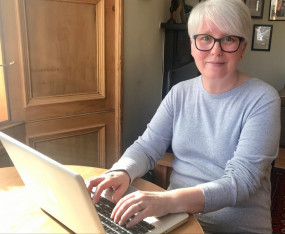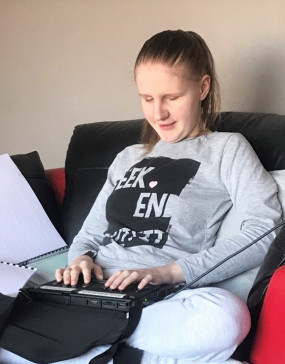Please note that as of October 2020, we now operate as Sight Scotland. Our former name, Royal Blind will appear in content, such as reports, produced before that date.
Press release
Children with visual impairments are ‘accessing the world’ with special braille devices as the coronavirus lockdown continues.
The BrailleNote Touch devices are being used by several Royal Blind School pupils to continue their learning while at home.
The Royal Blind School closed to day pupils in mid-March following government advice regarding the coronavirus outbreak, although support and care continues to be provided for residential pupils on campus.
The Royal Blind School is Scotland's only residential school specialising in the care and education of visually impaired children and young people, including those with complex needs and vision impairment. The school is run by Scottish charity Royal Blind.
Pam Young, a teacher at the Royal Blind School since 1996, said teachers had been in close contact with families since the school closed.
“For children who are blind or have a visual impairment, this lock-down has the potential to be very isolating,” Ms Young said.
“We’re finding creative ways to continue their socialisation with each other because that’s so important right now.
"We held a meeting on Microsoft Teams with everyone in our class. The kids were so excited to speak to each other it was difficult to end the lesson and it overran by 30 minutes.”
Ms Young said teachers have been emailing school work to pupils’ BrailleNote Touch tablets. The small devices have a braille keyboard and a refreshable braille display.
“The children are opening the attachments, completing the work, and emailing it back to us. We are then contacting them and chatting to them about the work they’ve done and what the next steps will be.”

Claire Cooper, Technology Support Assistant at the school, said pupils were “accessing the world online” with the devices.
“Braille tablets open the world up to young people with a visual impairment,” Mrs Cooper said.
“The BrailleNote does everything a phone or tablet does, but it also makes apps accessible for people with visual impairments, who cannot see the screen.
“Our pupils read the tablet’s refreshable braille display instead. Little bumps rise in the braille cells, translating text on the screen into braille dots, which pupils read.
“They can send and receive emails, use it as a word processor, access the internet and use it to listen to and read books."
Mrs Cooper said the devices could be used for several subjects.
“Pupils use the BrailleNote tablets for Maths, Science, English and other Humanities subjects. They use them to research topics and can work completely independently, which increases their confidence and self-reliance.”
Ms Young—a Qualified Teacher of Children with Vision Impairment (QTVI)—said subject teachers had found ways to conduct lessons remotely.
“Teachers are also using video conferencing to hold virtual drama lessons, virtual music lessons, and virtual PE lessons.”
Some children have been playing games such as 'Shut the Box', to reinforce their maths learning at home. Pupils use a braille die and must quickly add up the sum of numbers rolled.
The Royal Blind School’s Habilitation team have been sharing their expertise too, Ms Young said.
“The Habilitation staff are offering tips and advice on helping pupils to practice and maintain their orientation and mobility skills set, which they learn in their weekly lessons at school. For example, walking with a sighted guide as well as ways to practice their long cane skills,” she said.
Ms Young said teachers were determined to ensure children continued getting their education while the school was closed to day pupils.
"As teachers, we are called to be research practitioners, always seeking new ways to make learning accessible for our pupils. This is especially true for us now, during these unprecedented times.
“We are now faced with the challenge of working with new technology and developing new ideas in a rapidly changing landscape in order to ensure learning continues for our pupils. It's been difficult, but also quite exhilarating to realise what can be achieved.”
Royal Blind, the Scottish charity that runs the school, also offers residential care services for adults and older people with visual impairments. Key workers in residential care services now require facemasks and other PPE to keep them and the people they care for safe. Donations would be greatly appreciated at this time.
Text BLIND to 70460 to donate £3 to Royal Blind. Texts cost £3 plus one standard rate message.

To arrange an interview with Pam Young or to receive the photos in this blog, please contact:
Robert Steven, PR and Communications, Royal Blind,
0772 8699 080, robert.steven@royalblind.org
NOTE TO EDITORS:
Royal Blind is Scotland’s largest visual impairment charity and runs services for people with sight loss of all ages. We support children and young people through the Royal Blind School, after school and holiday club and educational outreach services. We have care homes for young people with complex needs and others for older people with sight loss and additional needs such as dementia. Through the Scottish Braille Press, we provide transcription into large print, audio and braille for thousands of blind people across the UK.
Royal Blind operates entirely in Scotland and is distinct from the Royal National Institute for the Blind (RNIB), which is a UK-wide organisation. The two organisations regularly work collaboratively to support the interests of people with visual impairment in Scotland.